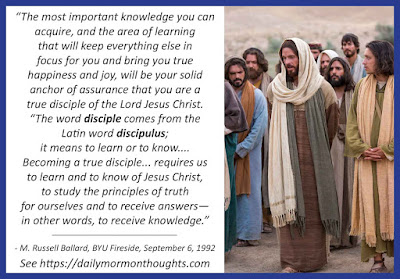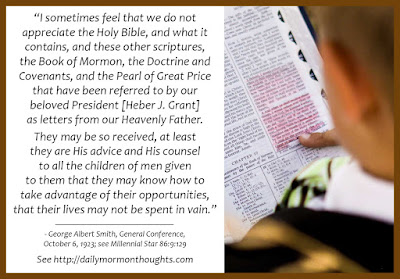"As I read and ponder the scriptures and carefully consider the Lord's counsel to His followers in every dispensation of time, it appears to me that the most important thing every one of us can do is to examine our own commitment and devotion to the Lord Jesus Christ. We must carefully guard against spiritual apathy and work to maintain the full measure of our loving loyalty to the Lord....
"Each one of us needs to follow Nephi's counsel to 'press forward with a steadfastness in Christ, having a perfect brightness of hope, and a love of God and of all men. [For] if ye shall press forward, feasting upon the word of Christ, and endure to the end, behold, thus saith the Father: Ye shall have eternal life' (2 Ne. 31:20). The power of the Holy Ghost will fill our hearts and minds as we look to the Savior for answers to the many challenges of life.
"Therefore, my brothers and sisters, it is important that we each know for ourselves that Jesus is the Christ and that He has restored to the earth through the Prophet Joseph Smith the fulness of His everlasting gospel. As we press forward in His service, spiritual experiences will increase our faith, and we will find great joy. Our understanding of the essential doctrines and eternal truths that have been restored will become a firm foundation of our faith."
- M. Russell Ballard, "How Is It With Us?", Ensign, May 2000, pp. 31-33
Click here to read the full talk
What is "the most important thing every one of us can do"? That question certainly could be answered a number of ways in different contexts. Elder Ballard pondered the scriptures and the Lord's counsel and concluded that the answer relates to our devotion to the Savior and His teachings, "our loving loyalty to the Lord," as described here:
Elder Ballard promises that when we face challenges in life, "as we look to the Savior for answers" then "the power of the Holy Ghost will fill our hearts and minds." That promise is very real, and that gift should be earnestly sought by all. We must seek diligently and "press forward" faithfully in spite of any difficulty or apparent obstacle. In the seeking for knowledge and understanding, we not only find "great joy" in this life, but we establish a foundation for faith on which we can build solidly.
(Compilation and commentary by David Kenison, Orem, Utah, 2022)
February 27, 2016
February 27, 2016





































